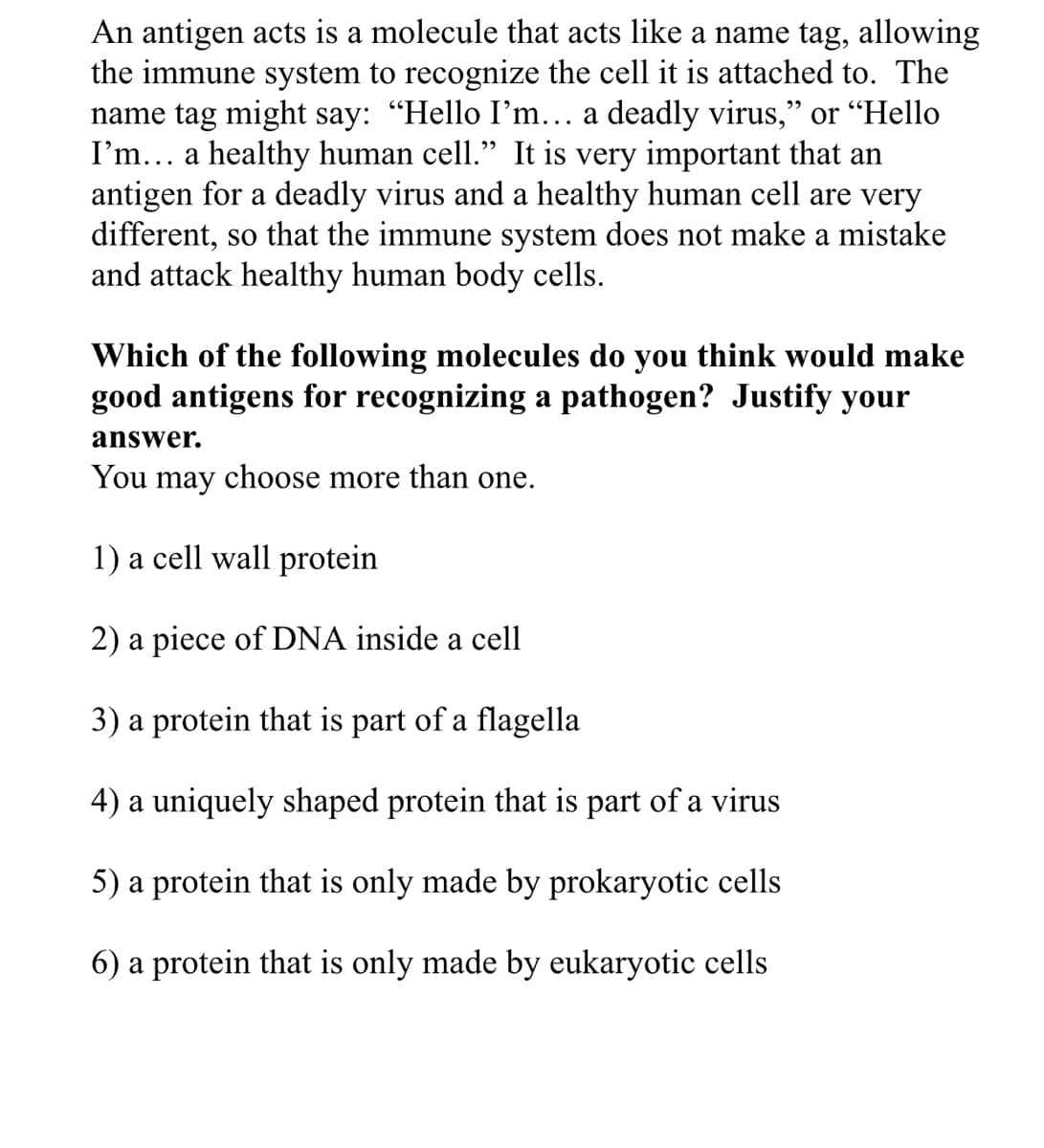An antigen acts is a molecule that acts like a name tag, allowing the immune system to recognize the cell it is attached to. The name tag might say: "Hello I'm... a deadly virus," or “Hello I'm... a healthy human cell." It is very important that an antigen for a deadly virus and a healthy human cell are very different, so that the immune system does not make a mistake and attack healthy human body cells. Which of the following molecules do you think would make
An antigen acts is a molecule that acts like a name tag, allowing the immune system to recognize the cell it is attached to. The name tag might say: "Hello I'm... a deadly virus," or “Hello I'm... a healthy human cell." It is very important that an antigen for a deadly virus and a healthy human cell are very different, so that the immune system does not make a mistake and attack healthy human body cells. Which of the following molecules do you think would make
Human Heredity: Principles and Issues (MindTap Course List)
11th Edition
ISBN:9781305251052
Author:Michael Cummings
Publisher:Michael Cummings
Chapter17: Genes And The Immune System
Section: Chapter Questions
Problem 10QP: The Adaptive Immune Response Is a Specific Defense Against Infection Researchers have been having a...
Related questions
Question

Transcribed Image Text:An antigen acts is a molecule that acts like a name tag, allowing
the immune system to recognize the cell it is attached to. The
name tag might say: "Hello I'm... a deadly virus," or “Hello
I'm... a healthy human cell." It is very important that an
antigen for a deadly virus and a healthy human cell are very
different, so that the immune system does not make a mistake
and attack healthy human body cells.
Which of the following molecules do you think would make
good antigens for recognizing a pathogen? Justify your
answer.
You may choose more than one.
1) a cell wall protein
2) a piece of DNA inside a cell
3) a protein that is part of a flagella
4) a uniquely shaped protein that is part of a virus
5) a protein that is only made by prokaryotic cells
6) a protein that is only made by eukaryotic cells
Expert Solution
This question has been solved!
Explore an expertly crafted, step-by-step solution for a thorough understanding of key concepts.
This is a popular solution!
Trending now
This is a popular solution!
Step by step
Solved in 3 steps with 1 images

Knowledge Booster
Learn more about
Need a deep-dive on the concept behind this application? Look no further. Learn more about this topic, biology and related others by exploring similar questions and additional content below.Recommended textbooks for you

Human Heredity: Principles and Issues (MindTap Co…
Biology
ISBN:
9781305251052
Author:
Michael Cummings
Publisher:
Cengage Learning

Biology: The Dynamic Science (MindTap Course List)
Biology
ISBN:
9781305389892
Author:
Peter J. Russell, Paul E. Hertz, Beverly McMillan
Publisher:
Cengage Learning

Human Physiology: From Cells to Systems (MindTap …
Biology
ISBN:
9781285866932
Author:
Lauralee Sherwood
Publisher:
Cengage Learning

Human Heredity: Principles and Issues (MindTap Co…
Biology
ISBN:
9781305251052
Author:
Michael Cummings
Publisher:
Cengage Learning

Biology: The Dynamic Science (MindTap Course List)
Biology
ISBN:
9781305389892
Author:
Peter J. Russell, Paul E. Hertz, Beverly McMillan
Publisher:
Cengage Learning

Human Physiology: From Cells to Systems (MindTap …
Biology
ISBN:
9781285866932
Author:
Lauralee Sherwood
Publisher:
Cengage Learning

Anatomy & Physiology
Biology
ISBN:
9781938168130
Author:
Kelly A. Young, James A. Wise, Peter DeSaix, Dean H. Kruse, Brandon Poe, Eddie Johnson, Jody E. Johnson, Oksana Korol, J. Gordon Betts, Mark Womble
Publisher:
OpenStax College

Human Biology (MindTap Course List)
Biology
ISBN:
9781305112100
Author:
Cecie Starr, Beverly McMillan
Publisher:
Cengage Learning

Biology (MindTap Course List)
Biology
ISBN:
9781337392938
Author:
Eldra Solomon, Charles Martin, Diana W. Martin, Linda R. Berg
Publisher:
Cengage Learning